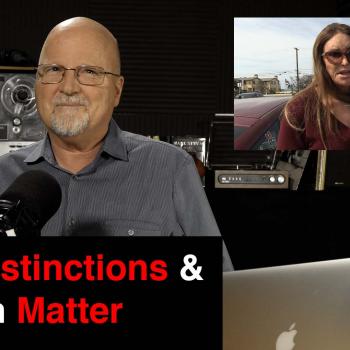
To purchase the entire Summit Lecture Series, Vol. 1 on DVD, go to summit.org
As a culture, we often use Motivation as a strategy
We see this in Christian Youth Groups across our country. We take high schoolers to a huge conference, get them really fired up with a great speaker who flips on his head and burps the alphabet and smoke and mirrors. We will rile them up! And in the midst of their emotional tension, we invite them to come forward and give their lives to Jesus and make decisions for the rest of their lives.
I remember going to one of these when I was young, and I went forward and committed to reading my Bible every single morning at 6:00 for the rest of my life. That didn’t even last two days.
You see, the thing about Motivation is that it can get you going, but it doesn’t keep you going. It is temporary.
This brings us back to Virtue. You see, part of being virtuous is doing what you don’t want to do simply because it is the right thing to do.
The question becomes: How do we become the sort of person who does the right thing, even when we don’t feel like it?
Another form of motivation that we often put into play is the idea of Incentives. Now, I’m actually a big fan of incentives, in certain occasions… you can even call it bribery. You know where bribery actually works in order to get good behavior? Potty training.
Now, I don’t have any idea how to potty train boys – I’ve heard that it has something to do with floating Cheerios – but, with girls, you potty train by doing the “potty dance” and giving them Skittles. You celebrate. You bribe them. It works. And, it’s a lot of fun, especially when the girls think that you should celebrate not only when they go potty, but when anyone goes potty… which makes trips to the airport really interesting. But, my point is that this type of motivation gets you going, right? Incentives can effectively motivate good behavior. But, let’s say that 15 years from now, I were to bring my daughter in front of a group that I’m speaking to and introducer her, “This is my daughter. She is 22-years-old and she will go potty for you if you give her a Skittle!” To say that would be a little weird would be an incredible understatement. Most likely, I’d have Child Protection Services or worse knocking on my door.
You see, if someone only does what they do because there is something in it for them – an incentive – then, they are not virtuous… they are a junkie.
And here’s the thing… if you only get up and do something because there is some immediate gratification in store for you, then you are a junkie. Not only that, but you are setting yourself up for failure. Because, as you get older, the decisions you make now have more and more gravity than the decisions you made previously in life. Meanwhile, the availability of immediate gratification is greater than it has ever been. So, the incentives you are most surrounded with are not to do the right thing, but to do the wrong thing. Therefore, as your behavioral patterns develop, and you grow more and more accustomed to be motivated by incentives, you set yourself up to live a life that actually lacks virtue, not one that is filled with it.
Then, there is the Liberal’s solution to everything: Education.
How do we fix the world? Education. Why is there crime? Not enough education. Why is there poverty? Not enough education.
Now, can a lack of knowledge sometimes be a valid problem in society? Absolutely. But, more knowledge is not necessarily the answer to our society’s moral problems.
As D.L. Moody said,
“If you take someone who steals railroad ties, and you give them an education, what you’ve done is taught them to steal the entire railroad the next time.”
If education is not used in the right way, it can actually encourage us to do the wrong thing… yet do it more efficiently or more effectively.
In his book The Fabric of Faithfulness, Steve Garber quotes a Duke University student:
“We’ve got no philosophy of what it is we want by the time somebody graduates. This so called curriculum is a set of hoops that somebody said students ought to jump through before graduation.”
No on seems to have asked how do people become good people. That’s the key missing question in today’s educational system. Even for those who attend worldview seminars like Summit Lecture Series can be filled with knowledge about virtue and Christian worldview, but that doesn’t mean that they will actually do the right thing. Being educated does not mean that anyone will actually love God or love others well. The key question is: How do you become a good person? How do you actually live the sort of life that you are supposed to live?
All this brings me to Self-Actualization… the Oprah solution that tries to replace virtue. This is also the Joel Osteen answer.
“Just look inside yourself. The answer lies within. You’re good enough, you’re smart enough, and doggone it, people like you. Just find yourself. Just get in touch with your authentic inner self.”
My friend, Mike Miller, revealed the problem with this when he asked, “What if we tell people to find themselves, and they do… but they are jerks?”
In other words, the problem – not the solution – might be inside. Therefore, looking within yourself cannot be the ultimate solution.
Chuck Colson used to say that one of the worst things you can tell people these days is, “Let your conscience be your guide.” Because that only works if you have a good conscience. I mean, telling people to go out and find themselves is like sending them out into a wilderness with a compass that only points back at themselves. In the same way that a working compass always points north – a fixed reference point that is unmovable and unchanging – a clear understanding of God, morality should be a fixed, unchanging reference point for our lives… not our own selfish desires or whims.











